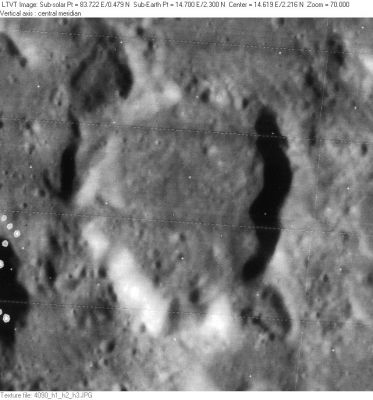Difference between revisions of "D'Arrest"
| Line 19: | Line 19: | ||
* Viscardy, 1985: 1.5 km | * Viscardy, 1985: 1.5 km | ||
| − | * The shadows in LO-IV-090H indicate the east rim of '''D'Arrest''' is mostly 1300-1600 above the points on the floor at which the shadows end. <span class="membersnap">- | + | * The shadows in LO-IV-090H indicate the east rim of '''D'Arrest''' is mostly 1300-1600 above the points on the floor at which the shadows end. <span class="membersnap">- JimMosher</span> |
<br /> | <br /> | ||
==Nomenclature== | ==Nomenclature== | ||
Latest revision as of 20:09, 16 April 2018
Contents
D'Arrest
|
Lat: 2.3°N, Long: 14.7°E, Diam: 30 km, Depth: 1.5 km, Rükl: 34 |
Images
LPOD Photo Gallery Lunar Orbiter Images Apollo Images
- D'Arrest was also photographed by Apollo 10. This crater was captured near the upper margins of Hasselblad frames AS10-32-4850 and 4851.
- A pair of good eyes could detect the location of D'Arrest on several north-looking frames made by Apollo 16's mapping/metric Fairchild camera, such as frame AS16-M-0831, in which D'Arrest's location is near the central part of the curved horizon, very near the couple of bowl-shaped craters Cayley and De Morgan.
- Additional research orbital Apollo 10 and Apollo 16 photography: Danny Caes
Maps
(LAC zone 60D4) LAC map Geologic map LM map AIC map
Description
Description: Wikipedia
Additional Information
Depth data from Kurt Fisher database
- Viscardy, 1985: 1.5 km
- The shadows in LO-IV-090H indicate the east rim of D'Arrest is mostly 1300-1600 above the points on the floor at which the shadows end. - JimMosher
Nomenclature
Heinrich Louis d'Arrest (July 13, 1822–June 14, 1875) was a Prussian astronomer, born in Berlin. While still a student, d'Arrest was party to Johann Gottfried Galle's search for Neptune. On September 23, 1846, he suggested that a recently drawn chart of the sky, in the region of Urbain Le Verrier's predicted location, could be compared with the current sky to seek the displacement characteristic of a planet, as opposed to a stationary star. Neptune was discovered that very night.
LPOD Articles
Bibliography
